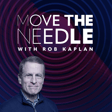
Scott and Kathleen Snook
This is Move The Needle with Rob Kaplan. Where we talk to people who lead, innovate, and inspire. Today on the Move The Needle, Rob will talk with Scott and Kathi Snook. Together, they know a lot about leadership, academics, and family.
Kathi joined the first co-ed class at the United States Military Academy at West Point, where she became the second highest-ranking cadet in the Corps and graduated with a degree in Engineering. As an Army Corps of Engineer Officer, she served in various positions, commanded an Engineer Company, and rose to the rank of Colonel. She holds a Master’s Degree in Applied Mathematics and a Doctoral Degree in Curriculum & Teaching, both from Boston University. Kathi’s personal and professional passions are focused on education and service.
Scott Snook is a Senior Lecturer at the Harvard Business School. He graduated with honors from West Point, earning the Royal Society of Arts Award for the most outstanding overall cadet in his class. Following graduation, he was commissioned in the US Army Corps of Engineers, where he served in various command and staff positions for over 22 years, earning the rank of Colonel before retiring in 2002. He has an MBA from the Harvard Business School, where he graduated with High Distinction as a Baker Scholar.


